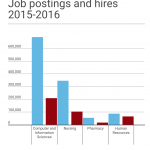
Faculty members at higher education institutions in the United States have increasingly grown to favor the use of online library websites for their research instead of printed books, according to an Ithaka S+R survey published Monday.
A prominent finding of the survey is that the role of the library building has changed. The percentage of faculty who choose to research in the library building has been on a decline since 2003, whereas the percentage of faculty who research using an online library catalog grew from the previous survey cycle in 2012.
Additionally, the survey found that since 2003, faculty members have continued to increase their use of the general purpose search engine, such as Google or Yahoo, as a research starting point.
Beginning in 2000, this triennial survey aims at tracking the shifts in faculty’s teaching and research preferences, and finding their implications for universities and their resources, such as academic libraries, the survey report stated. This year, the survey was executed in the fall of 2015 and had a sample of 145,550 faculty members across the United States, 9,203 of whom responded.
“In addition to providing traditional print resources, libraries have more recently supported these changes with a variety of digital tools including the library website, catalog, and discovery services,” the survey report stated.
Christine Wolff, the survey administrator at Ithaka S+R in the Libraries and Scholarly Communication program, stated that the institution considers this survey an important tool to track changes in faculty trends.
“This kind of survey allows us to examine key shifts in the way faculty members teach and perform research over time,” she wrote in an email.
Wolff also stated that the survey included medical faculty members for the first time this cycle, because the librarian community is interested in understanding medical faculty’s practices and preferences.
Thirty-seven percent of medical faculty members responded that they strongly agree that librarians’ roles in their institutions are becoming less important, the survey found. The survey also showed that medical faculty members are more comfortable with the transition to electronic sources compared to members in other disciplines, Wolff added.
“[Medical faculty members] also strongly believe societal impact, or the benefit of scholarly work and research products to society, should be a key measure of research performance for tenure, promotion, or funding proposals,” Wolff wrote.
For many faculty members, the role and function of libraries are to assist members of the community that extend beyond higher education faculty, Wolff wrote.
“We saw a substantial increase in the share of faculty members who find great value … in the library’s ability in helping undergraduate students to develop research, critical analysis, and information literacy skills,” Wolff wrote.
Boston University spokesperson Colin Riley said libraries play an important role in the university, but it is hard to conclude how BU faculty members use libraries.
“BU is not just one university,” Riley said. “It is also 17 colleges, so faculty members from all colleges have different experiences.”
Several students said surveys regarding university faculty play a key role in ensuring the quality of education the students receive.
Olivia Porada, a first-year graduate student in the Metropolitan College, said having an outside organization conduct survey on professors is important because an unbiased perspective can evaluate how well professors’ agendas fit in the institution.
“Different degrees require different ways of teaching, and the focus depends on the type of program,” Porada said.
Taylor Fleetham, a senior in the College of Engineering, said surveys about university faculty are important in maintaining productive relationships between faculty, students and university resources.
“If you don’t [conduct] research [on] faculty as frequently as you can, universities might lose touch in their interaction with students and faculty,” Fleetham said. “It’s good to know there are organizations [that] look into those trends.”
Aine Varden, a freshman in the College of Arts and Sciences, said surveys on faculty are more important for larger universities such as BU than for smaller institutions.
“Sometimes professors teach in their own ways,” Varden said. “In a school as big as BU, it is important to make sure that there is a consistency in faculties’ teaching system.”



